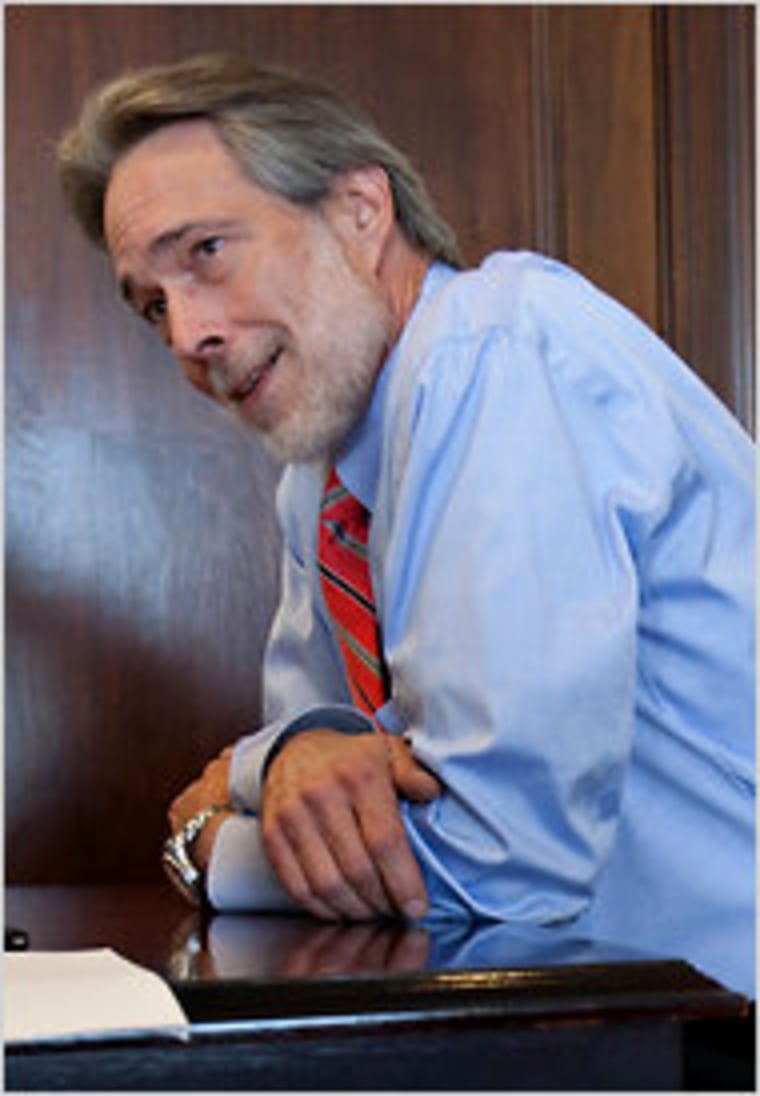So much for détente.
After a brief truce of sorts between the White House and business leaders, the top lobbyist at the U.S. Chamber of Commerce took aim at President Obama on Tuesday over an as-yet unannounced plan to force government contractors to disclose their political giving.
The lobbyist, R. Bruce Josten, said in an interview that the powerful business bloc “is not going to tolerate” what it saw as a “backdoor attempt” by the White House to silence private-sector opponents by disclosing their political spending.
“We will fight it through all available means,” Mr. Josten said. In a reference to the White House’s battle to depose Libya’s leader, Col. Muammar el-Qaddafi, he said, “To quote what they say every day on Libya, all options are on the table.”
While no final decision has been announced, the White House has acknowledged that Mr. Obama is considering issuing an executive order requiring all would-be federal contractors to disclose direct and indirect political spending of more than $5,000.
The order could, for instance, force a military contractor or an energy company seeking federal work to report money it gave to the Chamber of Commerce or another advocacy group to help finance political ads and expenditures.
After tens of millions of dollars in anonymous political spending flooded the 2010 elections following a landmark Supreme Court decision in the Citizens United case, Democrats tried to pass a bill known as the Disclose Act to require greater reporting of political spending, only to see it blocked by Senate Republicans. Democrats are now turning to other means, including the possible White House order and a lawsuit filed last week against the Federal Election Commission, to achieve similar ends.
When asked about the possible order this week, the White House spokesman, Jay Carney, said, “What the president is committed to is transparency, and he certainly thinks that the American taxpayer should know where his or her money is going.”
'Regulatory over-reach?'
The sparring over the issue disrupts several months of relative calm between the White House and business leaders.
The two sides clashed last year over Congressional action on health care and business regulations, with the chamber spending $42 million on the 2010 midterm elections to push its opposition to administration policies.
But in February, Mr. Obama crossed Lafayette Park for a speech at the chamber at which he promised to be “more neighborly” with business leaders. Elizabeth Warren, the administration official in charge of setting up a consumer protection bureau, delivered a similar message of partnership in another speech before the group last month, and chamber executives also pledged to work cooperatively with the White House.
Mr. Josten, in an interview at his spacious office in view of the White House, said the chamber was concerned about a variety of Obama administration policies that it considered potentially damaging to businesses in a time of economic uncertainty.
Those concerns include the efforts to carry out last year’s health care plan, a vast expansion of business regulations under the Dodd-Frank measure passed by Congress and the slow pace of new trade agreements with foreign nations.
American businesses “are losing market share” globally to countries like Canada that have enacted new trade pacts, Mr. Josten said. “The rest of the world — while we’re sitting around doing nothing — is racing ahead.”
But much of the renewed tension can be traced to the prospect of the White House order on political disclosures — first disclosed last week in a blog posting by Hans von Spakovsky, a conservative lawyer who worked on election law in President George W. Bush’s administration.
The Business Roundtable, another powerful business association made up of leading chief executives, also urged the White House on Tuesday not to move ahead with the draft order. It called the proposal “yet another example of regulatory over-reach” and said it would increase paperwork and drive up costs for businesses.
On Tuesday, 27 Republican senators also sent Mr. Obama a letter accusing him of playing politics through the proposal.
Mr. Josten said that the order as now drafted would also stifle free speech rights for businesses that worked with the government by subjecting them to harassment and protests if their political spending were disclosed.
As one example, he pointed to the Target Corporation, which was the object of boycotts and protests at its stores last year after reports said that the company gave $150,000 to a Minnesota business group that supported a Republican candidate opposed to gay marriage. “This is meant to have a chilling effect,” he said of the disclosure plan.
This story, "Lobbyist Fires Warning Shot Over Donation Disclosure Plan," originally appeared in The New York Times.
